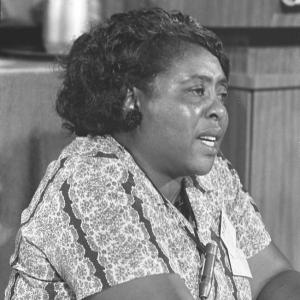News
Celebrating Civil and Voting Rights Activist Fannie Lou Hamer

Civil and voting rights activist Fannie Lou Hamer was born October 6, 1917, in Montgomery County, Mississippi, to sharecroppers Lou Ella and James Townsend. Growing up in poverty, Hamer began picking cotton at age six and left school for work at age 12. In 1944, she married Perry Hamer and together worked on a Mississippi plantation owned by B.D. Marlowe where she also served as plantation timekeeper because she was the only worker who could read and write.
In 1961, while undergoing surgery to remove a uterine tumor, Hamer was given a hysterectomy by a white doctor without her consent. This forced sterilization of Black women was so widespread it was dubbed a “Mississippi appendectomy.” As a result, the Hamers adopted two daughters.
In the Summer of ‘61, Hamer attended a meeting led by civil rights activists James Forman of the Student Non-Violent Coordinating Committee (SNCC) and James Bevel of the Southern Christian Leadership Conference (SCLC). Hamer’s anger over the efforts to deny Blacks the right to vote, led her to become an SNCC organizer where she worked closely with Local 73 member Jim Phipps.
“We organized Freedom Votes working to register black voters in rural Mississippi. Going from plantation to plantation,” recalled Phipps. “You have to understand, we were fighting against poll taxes and other restrictions meant to keep black people from voting. This was difficult work and we were harassed at every turn. But we understood how important it was to stand up for voting rights.”
On August 31, 1962, Hamer led 17 volunteers to register to vote at the Indianola, Mississippi Courthouse. They were denied the right to vote due to an unfair literacy test. On their way home police stopped their bus and fined them $100 for their bus being too yellow. Plantation owner Marlowe fired Hamer for her attempt to vote, confiscated much of her and her husband’s property, and forced her husband to stay on until the harvest. The Hamers ended up moving to Ruleville, Mississippi with very little.
In June 1963, following a successful voter registration program in Charleston, South Carolina, Hamer and several other Black women were arrested for sitting in a “whites-only” bus station restaurant in Winona, Mississippi. She and several of the women were brutally beaten in the Winona jailhouse, leaving Hamer with lifelong injuries from a blood clot in her eye, kidney damage, and leg damage.
In 1964, Hamer co-founded the Mississippi Freedom Democratic Party (MFDP), which challenged the local Democratic Party’s efforts to block Black participation. Hamer went to the Democratic National Convention that year with other MFDP members, arguing to be recognized as the official delegation. President Lyndon Johnson held a televised press conference to ensure Hamer would not get any television airtime while she spoke before the Credentials Committee, calling for mandatory integrated state delegations. Hamer’s powerful speech describing racial prejudice in the South would be televised later. Hamer’s vision for racial parity in delegations became a reality in 1968 and Hamer was a member of Mississippi’s first integrated delegation.
In 1964, Hamer helped organize Freedom Summer, bringing hundreds of Black and white college students to help with Black voter registration in the segregated South. That same year she announced her candidacy for the Mississippi House of Representatives but was barred from the ballot. In 1965, Hamer, Victoria Gray, and Annie Devine became the first Black women to stand in the U.S. Congress when they unsuccessfully protested the Mississippi House election of 1964.
“Fannie Lou was a powerful speaker,” said Phipps. “I booked her for multiple events, including speaking at the National Welfare Rights organization in 1969. She understood the importance of fighting against poverty and hunger. We met with Senator Robert Kennedy to show him first hand the impact of malnutrition for children in the south which led directly to his enhancing the federal food stamp program.”
In 1968, Hamer began a “pig bank” to provide free pigs for Black farmers to breed, raise, and slaughter. She then launched the Freedom Farm Cooperative (FFC), purchasing land Blacks could own and farm collectively. With the assistance of donors, she purchased 640 acres and launched a coop store, boutique, and sewing enterprise. Hamer single-handedly developed 200 units of low-income housing many of which still exist in Ruleville, Mississippi today. The FFC lasted until the mid-1970s and was among the largest employers in Sunflower County.
In 1971, Hamer helped found the National Women’s Political Caucus. She emphasized the power women could hold by acting as a voting majority in the country regardless of race or ethnicity. “A white mother is no different from a black mother. The only thing is they haven’t had as many problems. But we cry the same tears,” said Hamer.
Hamer died of breast cancer at the age of 59 in 1977.
“The best way we can honor Fannie Lou Hamer is by continuing her fight for civil and voting rights,” said Phipps. “Today we are facing attacks on voting rights that are just as insidious as what we faced in rural Mississippi in the 1960’s. We must fight back and stand up for the rights of everyone to vote.”
The John Lewis Voting Rights Advancement Act of 2021 (VRAA) will restore vital civil rights protections for voters while providing clear and consistent voting laws for every state to ensure all eligible voters can participate in our democracy.
Contact your U.S. Senators today and urge them to support the John Lewis Voting Rights Advancement Act.